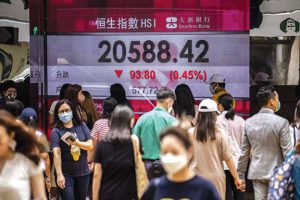Bloomberg
China’s almost-trillion dollar hedge fund industry risks worsening the turmoil in its stock market as deepening portfolio losses trigger forced selling by some managers.
About 2,350 stock-related hedge funds last month dropped below a threshold that typically activates clauses requiring them to slash exposures, with many headed towards a level that mandates liquidation, according to an industry data provider. Such signs of stress were “close to the historical high,†China Merchants Securities Co. analysts said in a report this month.
Unusual elsewhere, the selling rules are common in China, where they were introduced to protect hedge fund investors from outsized losses. They can, however, backfire in a falling market when many funds are forced to pare their stock holdings. In a sign regulators are taking notice, stock exchanges have been asking some funds to assess the pressure on their portfolios since March, according to people with knowledge of the matter, who asked not to be named as the discussions are private.
“The pressure on the market can be fairly big following the industry’s rapid expansion last year, especially if the quant funds’ reductions are concentrated,†given similarities in their trading strategies, said Yan Hong, director of the China Hedge Fund Research Center at the Shanghai Advanced Institute of Finance. While not normally a problem, these measures are “forcing many hedge funds to sell†in this year’s “highly volatile market,†he said.
Despite brief periods of respite, China’s benchmark CSI 300 Index had its worst January to April period since 2008. It has fallen about 17% so far this year, as a stringent Covid Zero policy and crackdowns on private enterprise combined to sap investor confidence. A slew of disappointing economic data from China this month also highlighted the growing toll of a lockdown-dependent approach, raising concerns that markets will remain under pressure unless China shifts its approach.
For a hedge fund industry that surged 66% last year to end up with 6.1 trillion yuan ($903 billion) of assets under management, it’s been a sharp reversal of fortunes. The sector was managing 6.35 trillion yuan as of March 31.
Every strategy booked losses in the first quarter except for funds focused on commodities. The requirement to sell when certain triggers are hit have lumped pressure on struggling funds, leaving little room for recovery.
As of April 22, almost 10% of over 24,500 stock-related hedge funds tracked by Shenzhen PaiPaiWang Investment & Management Co. had fallen below 0.8 yuan in net value per unit, a typical warning line that often requires a fund to cut its stock position below 50%.
They remained above 0.7 yuan, a so-called stop-loss line that mandates liquidation. About 7% of the funds tracked have breached that threshold. More than 1,000 funds have already been liquidated prematurely this year, according to the Merchants Securities report.
Data from consultancy Geshang Wealth had more than a quarter of the 1,153 long-only funds it tracks below 0.8 yuan as of May 5, a jump from 16% in mid-March.
Forced selling at market lows like this not only fuels stock declines, but prevents managers from adding positions to capture any potential rebound, said Xie Shiqi, an analyst at Beijing Jinzhang Investment Management Ltd., a hedge fund affiliated with Geshang Wealth.
China’s CSI 300 Index rallied 2% on Friday after local banks cut a key interest rate for long-term loans by a record amount, helping the benchmark cap a second straight week of gains.
 The Gulf Time Newspaper One of the finest business newspapers in the UAE brought to you by our professional writers and editors.
The Gulf Time Newspaper One of the finest business newspapers in the UAE brought to you by our professional writers and editors.
